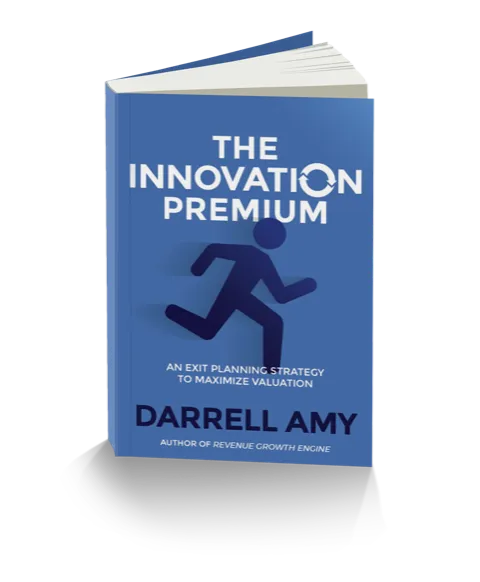THE FOUNDER INDEPENDENCE BLOG
Dive into our latest blog posts where we explore key strategies and real-life case studies designed to help you increase the valuation your business.

Understanding Buyer Motivation: The Key to Enhancing Your Company’s Valuation
Why would someone buy your company? Knowing the answer is critical to maximizing your company’s value.
The innovation guru, Clay Christensen, believed that buyers don’t buy products; they hire them for a job to be done. Similarly, Theodore Levitt famously said, “People don’t go to the store to buy a drill bit; they go to buy a hole.”
The same principle applies when selling your company. Buyers don’t buy companies; they hire them to perform specific jobs. The type of job an investor hires your company to do determines its valuation.
In this article, we will explore different reasons someone might buy a company. These reasons span a spectrum of value, from low valuation to high valuation. Smart owners understand this and begin working today to set their company up for a high valuation.
Level 1 Job: I Need More Assets
The most basic job to be done is a buyer needing the assets your company has. In 2020, tractor-trailers became scarce. Many manufacturers like Volvo and Peterbilt had multiple-year backorders on new trucks, and used trucks were hard to find. Buyers needed to deliver their products but lacked enough trucks. Consequently, some companies bought others just for their fleets of trucks.
This may have been a lucrative sale opportunity in 2020. However, selling a company at book value for its assets is typically a notch above a fire sale. Buying a company for its asset value generally yields a low valuation.
Level 2 Job: Better Return on My Cash
A second job to be done is a buyer seeking a source of predictable cash flow. This buyer looks at the historical cash flow of the company. Based on their risk tolerance, they forecast future cash flow and discount it for the time it will take to receive the cash. For example, $1 million today is worth more than $1 million one, two, or three years from now. This principle is behind the discounted cash flow model used to value businesses.
This potential buyer has cash to invest. Their job is to get the highest possible return on their cash. They have many options: purchasing publicly traded stocks, real estate, municipal bonds, certificates of deposit at a bank, or buying your company.
Level 3 Job: Sell My Company at a Higher Multiple
Some buyers want to buy your company to maximize their own company's value. Investors get nervous about the risk of buying small companies with revenue under $20 million. Let's say a potential buyer has $10 million in revenue. Their job is to surpass $20 million to command a high valuation.
There are various ways to grow from $10 million to $20 million: investing in marketing, adding salespeople, opening an office in a new city, launching a cross-sell program, or buying your company. Buying your company might be more expensive but faster and less risky.
Level 4 Job: Grow My Customer Base Fast
Some buyers want to grow their customer base. They see your customers as good candidates for their products or services. Strategically, they believe that buying your company and selling new products to your customers will multiply their investment. For example, a medical software company might buy a medical supply company serving a large group of clinics to sell software to these customers.
Similar to Level 3, there are many ways to grow a customer base. Buying your customers might be a smarter strategy.
Level 5 Job: Look Good to My Investors
This buyer needs to impress their investors. Their earnings might be flat or declining. It might have been a long time since they launched a new product, making their investors restless and possibly causing the stock price to decline. Their biggest competitor might have just launched a new feature or service that has created a competitive advantage.
This buyer might buy your company because they need some good news to show their company is moving forward.
Level 6 Job: I Need to Get Unstuck
Some companies are stuck. Their industry is shrinking, their product has matured, and their revenue and profits are shrinking. They feel stuck.
The job to be done is to get unstuck. This potential buyer is looking for a spark, a catalyst, or some innovation. Maybe they value the leadership and culture of your company.
Conclusion: What Jobs to Be Done Could You Do for Potential Buyers?
The above examples are not exhaustive, but they illustrate a spectrum of potential valuation, ranging from low value based on selling assets to medium value based on discounted cash flow and higher value based on solving strategic problems.
With 8 out of 10 company owners open to selling their business in the next decade, it is important to start thinking about how that sale could look.
- What types of buyers could you attract?
- What jobs might they want to be done?
- How can you structure your company now to be attractive to the best buyers?
All of this begins with understanding the current valuation of your company and what is driving that value. To discover these, visit Value Creation Engines.
Originally published on Darrell Amy's LinkedIn.
FREE BUSINESS VALUATION
What is Your Business Worth?
You can Discover the Value of Your Business in Less than 20 Minutes!
Join 70,000 business owners and get your score on the 8 Factors That Drive Your Company’s Value, a comprehensive analysis of your score and a detailed action plan for how to improve your score on each.

PREORDER YOUR FREE COPY NOW
Discover How to Create a Premium Valuation for Your Business
Learn how to command a premium multiple on your business
Find out why buyers discount their offers
See how innovation can help you create a premium valuation
Estimate your company's innovation index



